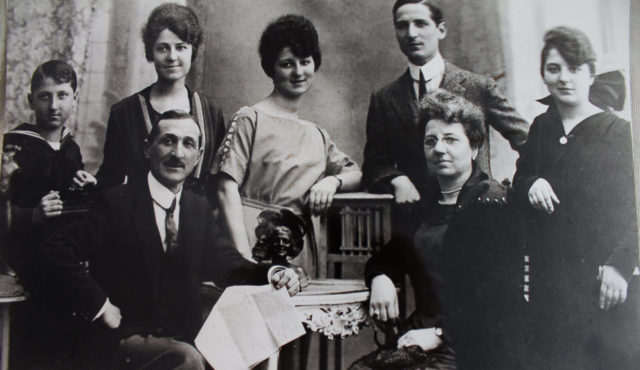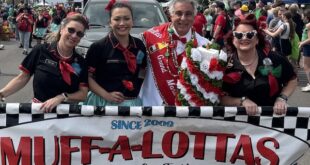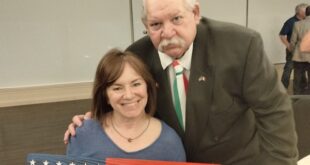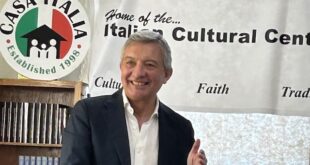In her memoir, Eleanor Foa addresses her family’s power, passion and paradox, and discovers deep literary significance in her Italian-Jewish ancestry.
Being so strongly identified with Catholicism, Italy may strike the casual observer as inextricably connected to Christianity. But a closer look reveals that Italian Jews had much to do with the region’s history, culture and proud traditions. How much so? As Rabbi Barbara Aiello explained in a past Lou&A column, the very name “Italia” is of Hebrew origin. The first of the Jewish diaspora, on seeing the peninsula’s beautiful, misty coast, exclaimed “Aiee-tal-ya!”, a Hebrew phrase that means “the coastline of God’s dew.”
Fast-forward to the 21st century and Eleanor Foa’s new memoir, “Mixed Messages: Reflections on an Italian Jewish Family and Exile” (Centro Primo Levi publishers). In it, this past president of the American Society of Journalists and Authors traces her life’s journey in the context of her faith tradition, an odyssey that takes her across centuries, nations and generations.
Lou&A spoke with Foa to learn more about her family history — which intersects with important religious history in Italy — and how she assembled missing pieces, relishing in a journey that taught her how to come to grips with and reconsider her family and roots.
Lou&A: Your parents sound like they were incredible people. What qualities of theirs, and your experiences with them, made the most impact on your life?
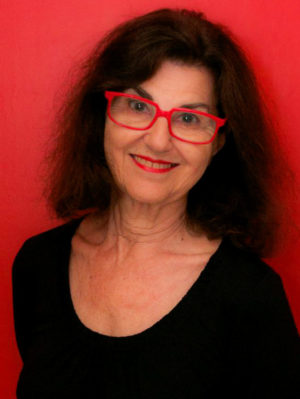 Foa: My mother was a great cook, and her passion for food as well as art had a big influence on me. My father was a brilliant European intellectual, by which I mean that he had a classical education, read widely, had a firm grasp of European history, enjoyed writing and possessed a curious mind and spirit into his 90s. His effect on me was profound. His interests became my interests: history, classical music, the life of the mind, writing. I didn’t realize that I was lucky to have such a father until much later.
Foa: My mother was a great cook, and her passion for food as well as art had a big influence on me. My father was a brilliant European intellectual, by which I mean that he had a classical education, read widely, had a firm grasp of European history, enjoyed writing and possessed a curious mind and spirit into his 90s. His effect on me was profound. His interests became my interests: history, classical music, the life of the mind, writing. I didn’t realize that I was lucky to have such a father until much later.
Lou&A: Your first memoir was “Whither Thou Goest.” Writing a second one is ultimately a very tricky business; we as writers hope we still have enough to say about our lives and journeys to interest readers. What was your special objective here, and how did your understanding and execution of that evolve as you continued to write and research?
Foa: “Mixed Messages” is hardly a conventional memoir. It’s a roots trip, a food trip, a dive into the history of the Jews in Italy, and an elegy to a Jewish family that lived through the rise and fall of fascism and World War II on three different continents, in very different ways. I wrote it over a period of a decade, so what I started out writing and what I wound up writing are miles apart. I write to find out what I think and feel about a subject; that is my way of processing life events.
Lou&A: You have an incredible background and you don’t shy from its contradictions. Your mother fled Nazi Germany, yet once safe insisted that your family hide its Jewishness. Your intellectual father was an economist who said money wasn’t important, yet amassed a fortune. How did writing the book help you come to terms with all this?
Foa: After my parents died I found myself writing about them. It was partly an effort to deal with my loss, and partly an effort to figure out things about them individually and as a couple: things that I didn’t understand. That was the “mixed messages” part.
Lou&A: It sounds as though you started the process for personal reasons, but that somehow changed.
Foa: After a trip with my sister to northern Italy to visit villages where my ancestors lived — and meet living relatives we hadn’t seen in years — it occurred to me that the trip could form the spine or structure of a memoir. It was something frankly I had to write for myself and only later did I begin to think it might be of interest to others.
Lou&A: While many Italian Americans are happy if they can trace their families back to the 1800s, you’ve managed to go much further than that — and also learn quite a bit about “I Fratelli Foà.” Share with us some of their publishing history.
Foa: Rabbi Tobia Foà, a man of exceptional culture and good deeds, established the press. I Fratelli Foà were printers of Bibles and Hebrew prayer books in 16th century Northern Italy. They flourished between 1551 and 1590 in the tiny, walled city of Sabbioneta. I’d become aware of them when, a decade earlier, an Israeli cousin had sent me copies of their handsome printer’s mark, or colophon. Their books are still considered exceptionally beautiful.
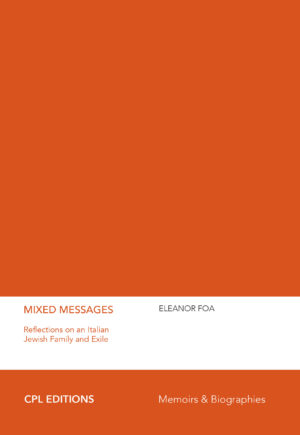 Lou&A: Traveling to Italy, you and your sister learned quite a bit about your ancestral roots in Sabbioneta. You describe yourself as falling in love with the town. Can you explain what captivated you?
Lou&A: Traveling to Italy, you and your sister learned quite a bit about your ancestral roots in Sabbioneta. You describe yourself as falling in love with the town. Can you explain what captivated you?
Foa: It’s an exquisite Renaissance walled city. So perfect and beautiful are the proportions of its two town squares that, when we drove through its red brick outer city walls, I thought I was on a BBC movie set filming a new version of “Romeo and Juliet.” It’s a magical place.
Lou&A: It was also an enlightened one.
Foa: Sabbioneta is the only city in Italy with the exception of Livorno that never established a Jewish ghetto. Vespasiano Gonzaga, the Duke of Sabbioneta, welcomed and respected Jews as “people of the book” at a time when other cities created ghettos and forced Jewish printers to close.
Lou&A: You’ve also spoken of “Mixed Messages” as “a sister story.” Yet you and your sister experienced a marked divergence in how you were brought up.
Foa: I think the differences between myself and my sister had a lot to do with the different generations we grew up in, in America, and the different stage in my parents’ marriage that we experienced. My father was more in my life than in my sister’s life.
Lou&A: You begin your memoir by writing, “Even in cosmopolitan New York, being an Italian Jew was a real showstopper.” There seems to be a powerful “mixed message” in terms of your being a native of Italy yet a transplant to New York, a Jew and yet not strictly observant. How did you hold on to your Italian cultural identity?
Foa: I always felt Italian, especially when I saw Italian movies or movies about Italians. Our home was very secular. I never felt looked down upon by other Italians. They were just surprised. In fact, Jews and Italians have so much in common culturally — family oriented, food oriented, mamma rules the roost — that except for the religious part, there was little that set us apart.
To learn more about “Mixed Messages: Reflections on an Italian Jewish Family and Exile,” visit eleanorfoa.com.
The above appears in the January 2020 issue of the print version of Fra Noi. Our gorgeous, monthly magazine contains a veritable feast of news and views, profiles and features, entertainment and culture. To subscribe, click here.
 Fra Noi Embrace Your Inner Italian
Fra Noi Embrace Your Inner Italian


